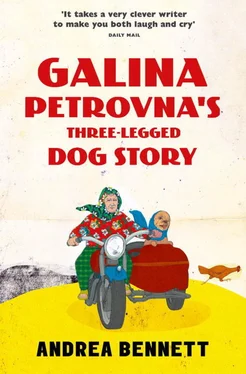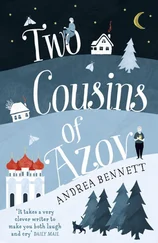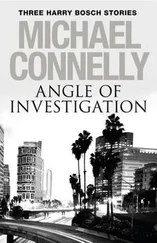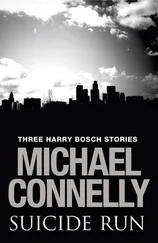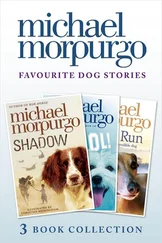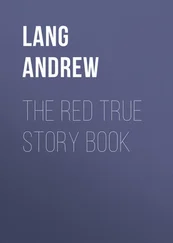Roma gave the cat-chair a stroke. ‘Galina Petrovna, I have to tell you, I couldn’t really make head or tale of what Grigory Mikhailovich and his cousin, the little sparrow lady there, were telling me. However, I understand you wanted to speak to me about a spot of bother that a friend of yours is in?’
Galia nodded long and vigorously, so much so that her bandana flew off her head and plopped into Roma’s drink.
‘It’s no bother, really, don’t worry. There’s more beer. But I’m afraid your bandana is ruined.’
‘I don’t care about the bandana, Roman Sergeevich. You see, I’m not really a Bohemian. I just want my friend, Vasily Volubchik, to be freed from the SIZO: he’s an old man, and he’s never done anything wrong. He’s an ex-teacher, and he has four grandchildren! Goodness knows, he’s done so much for Azov’s elderly people, with his club and his Lotto and his talks on vegetable matters—’
‘Calm yourself, Galina Petrovna. Perhaps another vodka, and a small beer to go with it? And a gherkin or two: let’s have some gherkins!’
Roman Sergeevich Glukhov raised his hand imperceptibly, and the midget hostess on roller-skates was by his side instantaneously.
‘So, tell me more? This is all happening in Rostov, is it?’
‘Azov, Roman Sergeevich. Much nicer than Rostov. And better cabbages,’ said Galia.
‘I’m sure the cabbages are fine. But I hear a dog is involved in this story, unless I am much mistaken, and I am a serious animal lover, Galina Petrovna. I myself have a dachshund called Eric.’
‘No!’
‘Oh yes. So I want to hear everything, my good lady, from start to finish.’
The drinks and gherkins arrived, and Roman Sergeevich pulled up a chair. He then stood and raised a toast to long life and faithful animals. Galia echoed the toast, downed her vodka and blotted her mouth delicately on the end of her bandana.
‘Everything,’ she nodded, somewhat in awe. ‘Well, let me tell you about my dog Boroda, so named because she has a fine, pointy beard—’
‘It is important to know every detail.’
‘Oh it is, Roman Sergeevich, it is. The devil is in the detail, I find.’
‘Oh yes,’ concurred Roman Sergeevich with a smile, ‘that’s what I always say to my bureaucrats.’
‘Quite. Anyway, I found her a few years ago, outside the station. Well, she found me, to be honest, in that way that dogs have…’
And so the elderly jodhpur-wearing Bohemian told her story to the charming Deputy Minister with the interesting scar, and together they sketched out the whole history of Azov, dogs, humans, the Great Patriotic War, Volgograd, the factory, thousand-eyed serpents, crooked policemen, annoying husbands, cabbage root fly and old ladies with sickles as big as the moon. In a room full of goggle-eyed fish-humans who danced on legs only recently evolved for that purpose, they made sense of the world, and set out to right a wrong.
And in another room, Grigory Mikhailovich, gyrating as best he could to the beats, winked conspiratorially at Zinaida Artyomovna, and the latter winked back.
A dog’s life is not all bad. It’s not all good, but it generally has a balance, depending on the humans around, the time of year, how many toes you’ve got to scratch with, and what kind of woof you can produce.
Boroda had enough toes to scratch with, enough legs to run with and teeth enough to eat with, so she counted herself a contented dog, in the greater scheme of things. She had had a life: she had warmed her bones by radiators thick with green paint; wrapped her tongue in sticky-sweet fudge wrappers; contemplated the wide southern skies and enjoyed the exquisite squeak of the refrigerator door opening. At some point there had been rats as big as cats to chase, and deep cool rivers to swim in. There had been different humans, and different boxes to sleep in. At times there had been no box at all, and occasionally no food. She licked her paw.
Life on the farm had been energetic and loud. The other farm dogs had shown her a trick or two, and she had done her best to get on and do as expected. But she was a gentle soul by nature, and not particularly clever: they quickly saw that she was no good as a guard dog, and not much of a hunter. She followed the pack, and kept her nose clean, but she was not a prized canine. She liked the women and children, but at the farm they were kept quite separate: she would occasionally receive a pat from a chubby pink hand, or a crust thrown over the fence, sometimes butter smeared, but there was none of the cosy comfort that she had grown to love as a mature dog. The farm had meant work.
The farm had also been full of machinery and sharpness, thumpings, scrapes and clankings. Boroda had often hidden among the calves when the machinery was being used: their black softness made her feel protected, and safe. Maybe it had always been her fate: maybe it was meant to be. But the machinery had been her downfall. She’d learnt the hard way that it was not to be climbed upon, no matter whether it was still and cold, and no matter how excited you were about the rats running around the grain store.
Boroda didn’t know what order her life had happened in; she could remember people and places, but not when they were. She remembered train tracks and kiosks, cold winds, fleas and ticks in her coat. And warmth: a quiet flat with sunshine and lino and plenty of bacon fat to eat and clear water to drink. Oh, treacherous bacon fat! Although she loved it, she knew it was not her friend. Bacon fat tempted her, made her move when she knew she should be still, and had, in the end, made her old lady very sad.
And now there was no old lady, and no bacon fat. Now there were just cages ranged along a long, dark room. She could stand up in hers and stretch her legs a little, the muscles shaking with the effort, but some of the other dogs were not so lucky. Every so often a pair of large black boots would beat down the corridor and dogs would be taken from their cages. They howled and barked, and some whined. But they never came back. Maybe they were moving on to new homes: new old ladies. Maybe the new homes were being rationed, and that was why it was so slow. There was certainly nobody here to give a tickle behind the ear or compliment a dog on a waggy tail. She sighed and turned around in her cage, and hoped that her turn for a new home would come soon.
She missed the kitchen table and the old lady. She could hear a radio somewhere far away, the sound muffled by several thick walls and windows. A clock was striking the hour. It reminded her of home. Her companions in their cages were getting restless: they had water, but no food. Some had been here since before she had arrived. Boroda’s belly had long since shrunk to a tight ball. She wasn’t hungry now. She yawned and let out a soft whine. She wanted to see her old lady: to sniff her floral skirt, and give her toes a gentle lick.
Footsteps echoed down the corridor, and Boroda stood as the now-familiar black boots stopped before her cage and a hand reached down to draw back the bolt. It hesitated, and then moved away again. Through the bars she could make out a shambolic human form, wad of papers in one hand, and broken eye glasses in the other. The human scratched its head, and tried to read what was written on the papers.
‘What the… where are the papers, dammit? They’ve sent the wrong ones!’ There was a scuffling of skin on paper, and then paper on concrete as the wad slipped from the fingers and cascaded on to the floor.
Boroda whimpered in response. She knew nothing about papers. The human bent to scrunch up the papers from the floor and let out an ‘argh!’ as its spine clicked painfully.
‘Why can’t they, just for once, do their jobs properly?’ the human snorted and straightened up gingerly, before stomping off back up the dark corridor and slamming the door. Boroda waited for him to re-appear, but all was quiet. She turned two circles in her cage, slowly and with difficulty, and sat back down, to wait. Somewhere close by, a dog howled.
Читать дальше
Конец ознакомительного отрывка
Купить книгу
